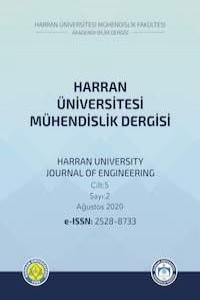Abstract
Sosyal medya platformları, kullanıcılara tüm kategorilerde düşüncelerini ve duygularını paylaşacakları bir mecra oluşturmuş ve günlük rutinin bir parçası haline gelmiştir. Yaygın sosyal medya kullanımı ile devasa boyutlarda veriler oluşmaya başlamıştır. Veri hacmindeki bu hızlı artışla, bu verilerin yönetilme ve içerisinden anlamlı bilgi çıkarılması ihtiyacı doğmuş ve akıllı hesaplama yöntemlerinin bu verileri analiz etmesi son derece kritik bir hale gelmiştir. Duygu analizi, anlamlı bilgi elde etmek için verilere uygulanan süreçler bütünüdür. Bu makalede, kullanıcıların durum güncellemelerini “tweet” şeklinde yayınladığı, çok sayıda kullanıcı tarafından kullanılan popüler sosyal medya sitesi olan Twitter verileri üzerinde duygu analizi yapılmıştır. Bu analizi gerçekleştirmek için Naïve Bayes ve Support Vector Machine gibi makine öğrenme yöntemleri kullanılarak tweetleri pozitif ve negatif sınıflara ayırmak için akıllı bir model oluşturulmuş ve karşılaştırmalı sonuçlar verilmiştir
Keywords
References
- C. E. D. Eyüp Sercan AKGÜL, «Twitter verileri ile duygu analizi,» Pamukkale University Journal of Engineering Sciences, cilt 22, no. 2, 2016.
- S. E. SEKER, «Duygu Analizi (Sentimental Analysis),» YBS Ansiklopedi, cilt 3, no. 3, pp. 21-36, 2016.
- Ş. E. Ş. Amine YEŞİLYURT, «Metin Madenciliği Yöntemleri ile Twitter Duygu Analizi,» YBS Ansiklopedi, cilt 4, no. 2, 2017.
- P. V. T. S. S. N. R. S. Gound, «Twitter Data Sentiment Analysis and Visualization,» International Journal of Computer Applications, cilt 180, no. 20, pp. 14-16, 2018.
- M. D. M. F. A. Tansa Trisna Astono Putri, «Sentiment Analysis On Twitter Using The Target-Dependent Approach And The Support Vector Machine (SVM) Method,» Jurnal Mantik, cilt 4, no. 1, pp. 20-26, 2020.
- C. Z. a. S. L. R. Xia, «Ensemble of feature sets and classification algorithms for sentiment classification,» Information Sciences, cilt 181, no. 6, pp. 1138-1152, 2011.
- R. B. a. L. H. A. Go, «Twitter sentiment classification using distant supervision,» CS224N project report, Stanford , 2009.
- J. Read, «Using emoticons to reduce dependency in machine learning techniques for sentiment classification,» Proceedings of the ACL student research workshop, pp. 43-48, 2005.
- M. Anjaria ve R. M. R. Guddeti, «Influence factor based opinion mining of Twitter data using supervised learning,» %1 içinde 2014 Sixth International Conference on Communication Systems and Networks (COMSNETS), Bangalore, India, 2014.
- S. N. R. J. Richa Sharma, «Opinion mining of movie reviews at document level,» International Journal on Information Theory (IJIT), cilt 3, no. 3, 2014.
- S. N. a. R. J. R. Sharma, «Polarity detection at sentence level,» International Journal of Computer Applications, cilt 86, no. 11, 2014.
- B.-R. D. Po-Wei Liang, «Opinion Mining on Social Media Data,» %1 içinde 2013 IEEE 14th International Conference on Mobile Data Management, Milan, Italy, 2013.
- O. C. K. O. Orhan BILGIN, «Building a Wordnet for Turkish,» ROMANIAN JOURNAL OF INFORMATION SCIENCE AND TECHNOLOGY, cilt 7, no. 1-2, pp. 163-172, 2004.
- E. Y. İ. Ç. A. K. Yeşim Aktaş, «Wordnet ve Bilgisayar Ağ Terimleri Sözlüğünün Oluşturulması,» %1 içinde Akademik Bilişim, 2016.
- K. Denecke, «Using SentiWordNet for multilingual sentiment analysis,» %1 içinde 2008 IEEE 24th International Conference on Data Engineering Workshop, Cancun, Mexico, 2008.
- B. İ. SEVİNDİ, «TÜRKÇE METİNLERDE DENETİMLİ VE SÖZLÜK TABANLI DUYGU ANALİZİ YAKLAŞIMLARININ KARŞILAŞTIRILMASI,» Ankara, 2013.
- R. Gandhi, «Support Vector Machine — Introduction to Machine Learning Algorithms,» towardsdatascience, 2018.
Details
| Primary Language | Turkish |
|---|---|
| Subjects | Computer Software |
| Journal Section | Research Articles |
| Authors | |
| Publication Date | August 27, 2020 |
| Submission Date | July 24, 2020 |
| Acceptance Date | August 19, 2020 |
| Published in Issue | Year 2020 Volume: 5 Issue: 2 |

